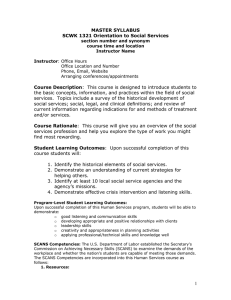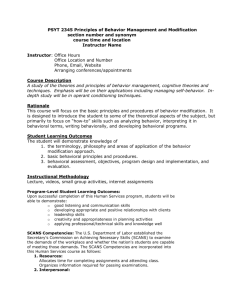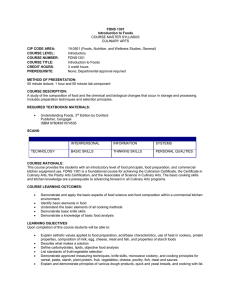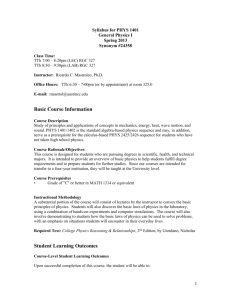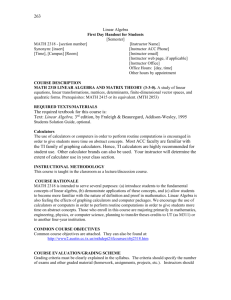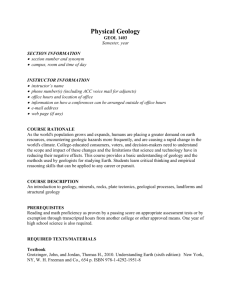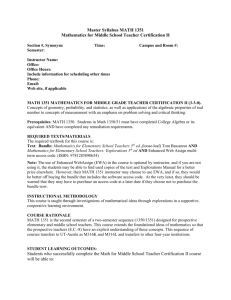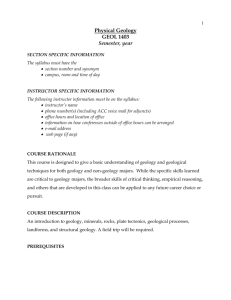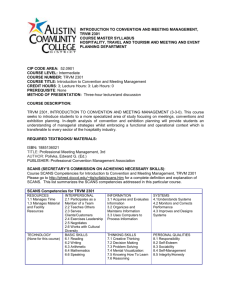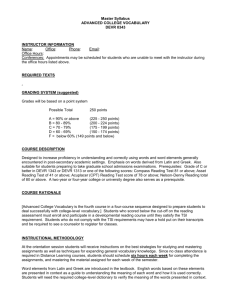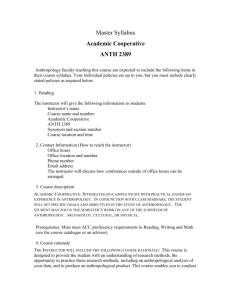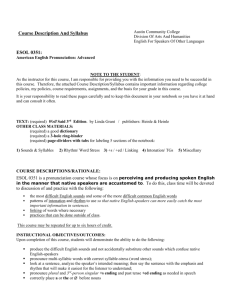Syllabus for PHYS 1401 - Austin Community College
advertisement
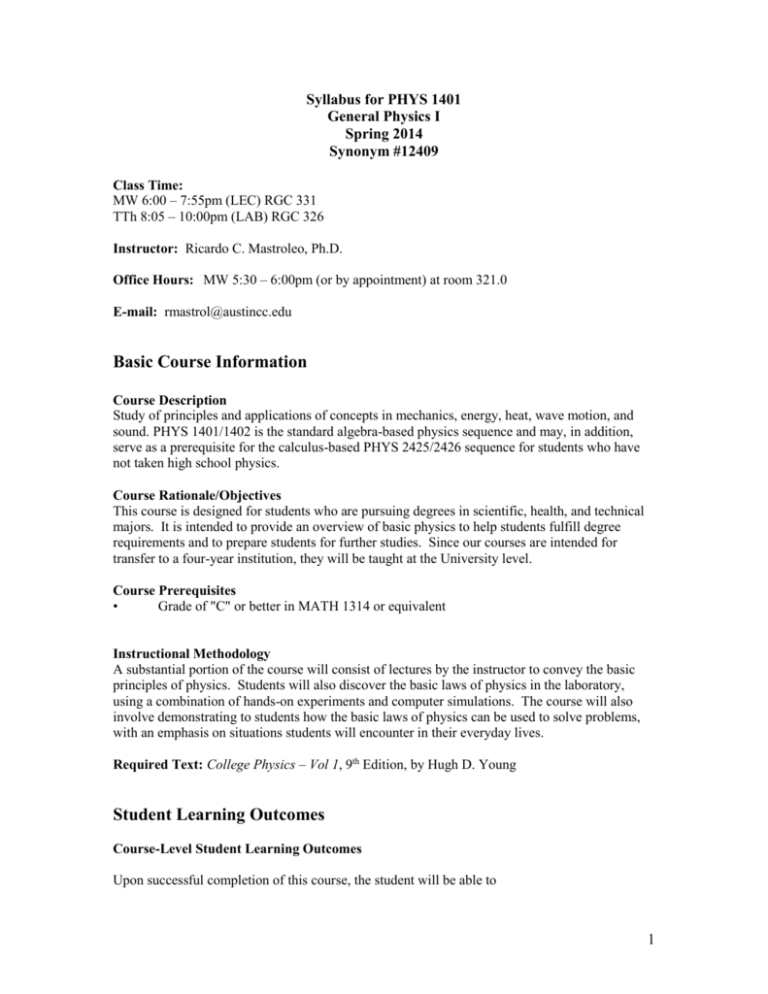
Syllabus for PHYS 1401 General Physics I Spring 2014 Synonym #12409 Class Time: MW 6:00 – 7:55pm (LEC) RGC 331 TTh 8:05 – 10:00pm (LAB) RGC 326 Instructor: Ricardo C. Mastroleo, Ph.D. Office Hours: MW 5:30 – 6:00pm (or by appointment) at room 321.0 E-mail: rmastrol@austincc.edu Basic Course Information Course Description Study of principles and applications of concepts in mechanics, energy, heat, wave motion, and sound. PHYS 1401/1402 is the standard algebra-based physics sequence and may, in addition, serve as a prerequisite for the calculus-based PHYS 2425/2426 sequence for students who have not taken high school physics. Course Rationale/Objectives This course is designed for students who are pursuing degrees in scientific, health, and technical majors. It is intended to provide an overview of basic physics to help students fulfill degree requirements and to prepare students for further studies. Since our courses are intended for transfer to a four-year institution, they will be taught at the University level. Course Prerequisites • Grade of "C" or better in MATH 1314 or equivalent Instructional Methodology A substantial portion of the course will consist of lectures by the instructor to convey the basic principles of physics. Students will also discover the basic laws of physics in the laboratory, using a combination of hands-on experiments and computer simulations. The course will also involve demonstrating to students how the basic laws of physics can be used to solve problems, with an emphasis on situations students will encounter in their everyday lives. Required Text: College Physics – Vol 1, 9th Edition, by Hugh D. Young Student Learning Outcomes Course-Level Student Learning Outcomes Upon successful completion of this course, the student will be able to 1 Demonstrate knowledge of Newton's Laws of Motion, and apply those laws to simple physical systems. Demonstrate knowledge of physical conservation laws, and apply those laws to simple physical systems. Demonstrate knowledge of wave motion and oscillations and apply that knowledge to simple physical systems. Demonstrate knowledge of thermal physics and apply that knowledge to simple physical systems. Demonstrate the ability to translate common language descriptions into multiple physical representations (e. g. diagrams, mathematical equations, physical models) and vice versa. Demonstrate the ability to collect, analyze, and interpret data. Demonstrate the ability to communicate findings in terms of fundamental physical concepts. Demonstrate the ability to communicate findings in terms of fundamental physical concepts. General Education Student Learning Outcomes Upon completion of this course, students will demonstrate competence in: Critical Thinking: Gathering, analyzing, synthesizing, evaluating and applying information. Interpersonal Skills: Interacting collaboratively to achieve common goals. Quantitative and Empirical Reasoning: Applying mathematical, logical and scientific principles and methods. Technology Skills: Using appropriate technology to retrieve, manage, analyze, and present information. Course Policies Grading System – Your grade will be determined as follows: Tests 40% Final 25% Homework 10% Laboratory 25% Based on the following scale: A 90-100 B 80-89 C 70-79 D 60-69 F 0-59 Tests – Three tests and a final exam will be given approximately every 3-4 weeks as shown in the course calendar. No make-up exams will be given. However, a student may replace their lowest test grade with their grade on the final exam. Attendance – Attendance is strongly advised and I expect you to attend class regularly. Each student must complete every lab. 2 Homework – Homework will be assigned every week and will be due a week later. Up to three late assignments will be accepted from each student without penalty. After the third one no more late assignments will be accepted. A late homework will not be accepted more than one week late. Assignments not turned in or not accepted (due to lateness) will be given grade 0. Laboratory – A major component of this course is the laboratory. You will perform laboratory exercises typically twice per week. Each will require a brief write-up which will be due at the end of that class period unless otherwise directed. Laboratory Make-up – You may make up a total of three missed laboratory periods. To makeup a laboratory obtain a copy of the missed activity from the instructor and then schedule a time to make up the lab with the laboratory coordinator. You must make up a missed lab within two weeks or a grade of 0 will be assigned for that lab activity. Typically make-ups are held on Friday mornings. Lab Groups – Students are free to choose their own lab groups. If a space is available a student may change a lab group. However, lab groups may not exceed four students without permission from the instructor. Instructor reserves the right to adjust lab groups if necessary. Help – If you need help, get it. I hold office hours to help students and you should view me as a primary source of aid. Also, free walk-in tutoring is provided by the Learning Labs, and I highly recommend this service. You are encouraged to work on homework assignments with classmates. However, regardless of the source of help you receive you are responsible for your own work. If you copy someone else’s homework without doing it yourself, you will not understand the material and despite having a good homework grade will not do well in the course. Organization – Please keep your assignments so that any possible errors in my grading records can be rectified. It is a good idea to keep your homework in a loose leaf binder for reference. Cell Phone – As a courtesy to your instructor and your classmates, please make sure that your cell phone is turned completely off before class. If you are expecting an urgent phone call, then please place the phone in a silent mode. Withdrawal Policy – It is the responsibility of each student to ensure that his or her name is removed from the roll should he or she decides to withdraw from the class. The instructor does, however, reserve the right to drop a student should he or she feel it is necessary. If a student decides to withdraw, he or she should also verify that the withdrawal is submitted before the Final Withdrawal Date. The student is also strongly encouraged to retain their copy of the withdrawal form for their records. Students who enroll for the third or subsequent time in a course taken since Fall 2002 may be charged a higher tuition rate for that course. State law permits students to withdraw from no more than six courses during their entire undergraduate career at Texas public colleges or universities. With certain exceptions, all course withdrawals automatically count towards this limit. Details regarding this policy can be found in the ACC college catalog. Incompletes – An instructor may award a grade of “I” (Incomplete) if a student was unable to complete all of the objectives for the passing grade in a course. An incomplete grade cannot be 3 carried beyond the established date in the following semester. The completion date is determined by the instructor but may not be later than the final deadline for withdrawal in the subsequent semester. Student Rights and Responsibilities – Students at the college have the rights accorded by the U.S. Constitution to freedom of speech, peaceful assembly, petition, and association. These rights carry with them the responsibility to accord the same rights to others in the college community and not to interfere with or disrupt the educational process. Opportunity for students to examine and question pertinent data and assumptions of a given discipline, guided by the evidence of scholarly research, is appropriate in a learning environment. This concept is accompanied by an equally demanding concept of responsibility on the part of the student. As willing partners in learning, students must comply with college rules and procedures. Statement of Scholastic Dishonesty – A student attending ACC assumes responsibility for conduct compatible with the mission of the college as an educational institution. Students have the responsibility to submit coursework that is the result of their own thought, research, or selfexpression. Students must follow all instructions given by faculty or designated college representatives when taking examinations, placement assessments, tests, quizzes, and evaluations. Actions constituting scholastic dishonesty include, but are not limited to, plagiarism, cheating, fabrication, collusion, and falsifying documents. Penalties for scholastic dishonesty will depend upon the nature of the violation and may range from lowering a grade on one assignment to an “F” in the course and/or expulsion from the college. See the Student Standards of Conduct and Disciplinary Process and other policies at http://www.austincc.edu/current/needtoknow Statement on Students with Disabilities – Each ACC campus offers support services for students with documented disabilities. Students with disabilities who need classroom, academic or other accommodations must request them through the Office for Students with Disabilities (OSD). Students are encouraged to request accommodations when they register for courses or at least three weeks before the start of the semester, otherwise the provision of accommodations may be delayed. Students who have received approval for accommodations from OSD for this course must provide the instructor with the ‘Notice of Approved Accommodations’ from OSD before accommodations will be provided. Arrangements for academic accommodations can only be made after the instructor receives the ‘Notice of Approved Accommodations’ from the student. Students with approved accommodations are encouraged to submit the ‘Notice of Approved Accommodations’ to the instructor at the beginning of the semester because a reasonable amount of time may be needed to prepare and arrange for the accommodations. Additional information about the Office for Students with Disabilities is available at http://www.austincc.edu/support/osd/ Safety Statement – Austin Community College is committed to providing a safe and healthy environment for study and work. You are expected to learn and comply with ACC environmental, health and safety procedures and agree to follow ACC safety policies. Additional information on these can be found at http://www.austincc.edu/ehs. Because some health and safety circumstances are beyond our control, we ask that you become familiar with the Emergency Procedures poster and Campus Safety Plan map in each classroom. Additional information about emergency procedures and how to sign up for ACC Emergency Alerts to be notified in the event of a serious emergency can be found at http://www.austincc.edu/emergency/ 4 You are expected to conduct yourself professionally with respect and courtesy to all. Anyone who thoughtlessly or intentionally jeopardizes the health or safety of another individual will be immediately dismissed from the day’s activity, may be withdrawn from the class, and/or barred from attending future activities. Specific safety training will take place before lab activities. If you are late or miss this training, you will not be able to participate in the activity. The complete ACC science safety policy can be found at http://www.austincc.edu/sci_safe/ Use of ACC email – All College e-mail communication to students will be sent solely to the student’s ACCmail account, with the expectation that such communications will be read in a timely fashion. ACC will send important information and will notify you of any college related emergencies using this account. Students should only expect to receive email communication from their instructor using this account. Likewise, students should use their ACCmail account when communicating with instructors and staff. Instructions for activating an ACCmail account can be found at http://www.austincc.edu/accmail/index.php. Testing Center Policy – Under certain circumstances, an instructor may have students take an examination in a testing center. Students using the Academic Testing Center must govern themselves according to the Student Guide for Use of ACC Testing Centers and should read the entire guide before going to take the exam. To request an exam, one must have: • ACC Photo ID • Course Abbreviation (e.g., ENGL) • Course Number (e.g.,1301) • Course Synonym (e.g., 10123) • Course Section (e.g., 005) • Instructor's Name Do NOT bring cell phones to the Testing Center. Having your cell phone in the testing room, regardless of whether it is on or off, will revoke your testing privileges for the remainder of the semester. ACC Testing Center policies can be found at http://www.austincc.edu/testctr/ Student and Instructional Services – ACC strives to provide exemplary support to its students and offers a broad variety of opportunities and services. Information on these services and support systems is available at: http://www.austincc.edu/s4/ Links to many student services and other information can be found at: http://www.austincc.edu/current/ ACC Learning Labs provide free tutoring services to all ACC students currently enrolled in the course to be tutored. The tutor schedule for each Learning Lab may be found at: http://www.autincc.edu/tutor/students/tutoring.php For help setting up your ACCeID, ACC Gmail, or ACC Blackboard, see a Learning Lab Technician at any ACC Learning Lab. Tentative Course Outline / Calendar – The calendar below displays the chapters to be discussed in each week. It also shows the dates of the tests with the respective chapters they will cover. The instructor reserves the right to adjust the calendar to meet the needs of the class. 5 Week 05/28 06/02, 06/04 06/09, 06/11 06/16, 06/18 06/23, 06/25 06/30, 07/02 07/07, 07/09 07/14, 07/16 07/21, 07/23 07/28, 07/30 08/04, 08/06 08/11 Chapter 0, 1 2, 3 3, 4 4 5, 6 7, 8 8 9, 10 11, 12 13 14, 16 Test (06/18) Test #1 (Ch. 1, 2, 3, 4) (07/09) Test #2 (Ch.5, 6, 7, 8) (07/28) Test #3 (Ch. 9, 10, 11, 12) (08/11) Final Exam (Ch 1-14, 16) 6
